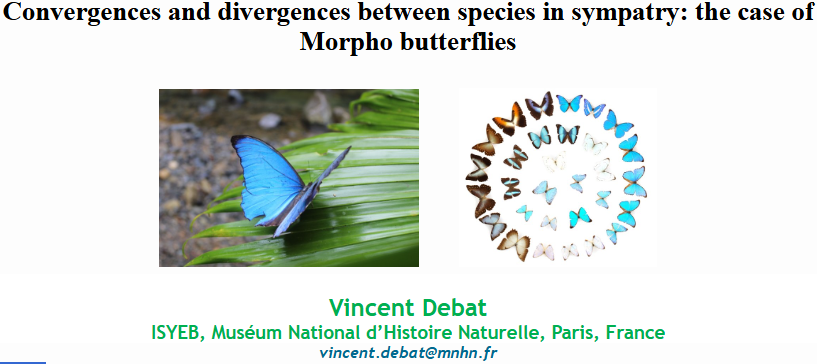Convergences and divergences between species in sympatry: the case of Morpho butterflies
(Seminar in English)
Vincent Debat
ISYEB, Muséum National d’Histoire Naturelle, Paris, France
vincent.debat@mnhn.fr
Vendredi 4 avril 2025
CEFE – Grande salle de réunion- 11h30
1919 route de Mende, Montpellier
The seminar will also be streamed live online.
Link to seminar: https://umontpellier-fr.zoom.us/webinar/register/WN_-J3blYapQa-xsBLSPXsAow
Access to campus (register before 11 on SEEM day): https://duo.dr13.cnrs.fr/public/evenement/index
Abstract
How do closely related species coexist in sympatry? What are the consequences of their interactions on their phenotypes? The importance of species interactions for speciation and phenotypic evolution is poorly understood.

Negative interactions, such as competition, have received much attention and may favour character displacement driving divergence among species. However, positive interactions may also strongly impact the evolution of sympatric species. For example, in chemically protected species, mimicry may drive local convergences. Such convergences might in turn enhance competition, with difficult-to-predict consequences. I will illustrate these questions by presenting the work conducted in our team on butterflies from the neotropical genus Morpho. Morpho are famous for their iridescent blue colors, but the evolutionary drivers of their diversification are mostly unknown. Many Morpho species are sympatric, with up to 12 species flying in the same localities of North Peru: what are the consequences of such coexistence on their evolution? I will first focus on the evolution of wing shape and flight, illustrating local divergences likely related to competition. I will then present some work on the evolution of colour patterns and iridescence, showing repeated local convergences. How these convergences in turn affect sexual interference and trigger evolution of other traits is currently under investigation – and I will give an overview of our ongoing projects.